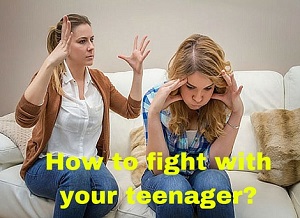Not many parents look forward to fighting with their teenagers.
But what if this conflict is seen as a good thing that helps your child develop effective thinking and problem-solving skills along with the compassion necessary to develop into a well-rounded and emotionally stable adult? Perhaps having a good fight might be worth it?
How do teenagers fight?
Experts in the area of adolescent behaviour have identified that teenagers use 4 styles of fighting:
- Attacking: increased aggression and fighting
- Withdrawing: stonewalling and refusing to participate in an argument
- Complying: giving in to parents wishes without a fight
- Problem-solving: works with the parent to solve the problem, even if there is disagreement
Teenagers who use the first three styles of fighting are more at risk of becoming depressed, anxious and engage in unacceptable or illegal behaviour. These teenagers are also more likely to experience difficulties in their relationships with others outside the family. Conversely, teenagers who use a problem-solving approach to deal with conflict with their parents enjoy better mental and emotional health and form stronger relationships with others now and in the future.
What is a good fight between parents and teenagers?
A good fight happens when both parents and teenagers can see the other person’s point of view. Bad fights happen when they don’t. This means parents and teenagers need to see both sides of an argument and consider what it would be like to be in the other person’s shoes. Luckily, during adolescence the teenage brain is developing the capacity to do just this. By being able to consider multiple viewpoints, a teenager is developing their capacity for abstract thinking, problem solving and empathy, and good fights provide an ideal opportunity to further hone these skills. But remember they are still learning so parents can also be a positive influence by being a good role model for showing how they take their teenager’s perspective on board during a fight.
5 tips for fighting with teenagers.
Although it may not always feel like it, a good fight can depend on a parent’s ability to steer the argument in the right direction. Here are some tips to help parents do that.
1. Be curious first: Reactivity is a parent’s worst enemy. Try to be curious first by listening and being interested to find out what’s going on for your teenager. Ask questions to help you understand your teenager’s reasoning. They might be wrong, but it could be coming from a place of trying to do the right thing.
2. Model the behaviour you want to see in your teenager: The saying “monkey see, monkey do” describes how a person imitates another person’s behaviour, good or bad, simply by just watching. Parents can use this to their advantage by modelling the behaviour they want to see in their teenager. However parents aren’t perfect so if you get it wrong, also model what you do in this situation – apologise and make a second start on addressing the issue. Your teenager will be amazed and respect you more for it.
3. Take time out: This is much easier said than done. However if everyone is so worked up that no one can listen or be curious about the other person’s point of view the fight will not end well. As a parent you need to make the call to give each other space and time to calm down, but with a commitment to come back and discuss the issue later. Be prepared to stand by this decision even if your teenager continues to try and engage in the fight with you.
4. Pick your battles: Not every argument or disagreement needs to be addressed in the same way. Sometimes the answer is simply “No” regardless of whether parents and teenagers agree. This may be due to safety concerns, legality, or age-appropriateness. However current research suggests that most day-to-day arguments provide teenagers with the a good opportunity to learn more about themselves, how they relate to others, the need for compromise, and the development of appropriate self-regulation skills. So for these reasons having some fights is beneficial.
5. Acceptance of your teenager as they are: Teenagers are not adults, even though they sometimes like to think so. Their brains are still going through crucial developmental changes that will allow them to become mature, functional, young adults. The transition from childhood to adult hood can be very turbulent. However as parents if we can accept this about teenagers, their behaviour might make more sense and this can help us to stay more on course with our parenting responses.
If you feel like you’re not getting anywhere when you fight with your teenager, you’re not alone. Contact Ahead Psychology on (07) 3352 3577 or use our online Request a Booking form and get the support you need. We have psychologists who specialise in working with children, teenagers and parents.

